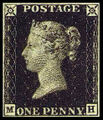Template:On This Day (nonfiction)/May 6: Difference between revisions
(Created page with "<gallery> || *** DONE: Pics *** File:Johann_Joachim_Becher.jpg|link=Johann Joachim Becher (nonfiction)|1635: Physician, alchemist, scholar, and adventurer Johann Joachim Be...") |
No edit summary |
||
| Line 76: | Line 76: | ||
</gallery> | </gallery> | ||
{{Template:Categories: May 6}} | |||
Latest revision as of 12:36, 5 May 2024
1635: Physician, alchemist, scholar, and adventurer Johann Joachim Becher born. Becher will propose Phlogiston theory in an attempt to explain processes such as combustion and rusting, which are now collectively known as oxidation.
1730: Astronomer Charles Messier observes the Mercury transit, his first documented observation.
1840: The Penny Black postage stamp becomes valid for use in the United Kingdom of Great Britain and Ireland.
1872: Mathematician, physicist, and astronomer Willem de Sitter born. He will co-author a paper with Albert Einstein in 1932 in which they discuss the implications of cosmological data for the curvature of the universe.
1895: Mathematician and academic Júlio César de Mello e Souza born. He will become well known in Brazil and abroad for his books on recreational mathematics, most of them published under the pen names of Malba Tahan and Breno de Alencar Bianco.
1937: Hindenburg disaster: The German zeppelin Hindenburg catches fire and is destroyed within a minute while attempting to dock at Lakehurst, New Jersey. Thirty-six people are killed.
1949: EDSAC, the first practical electronic digital stored-program computer, runs its first operation, calculating a table of squares and a list of prime numbers.






